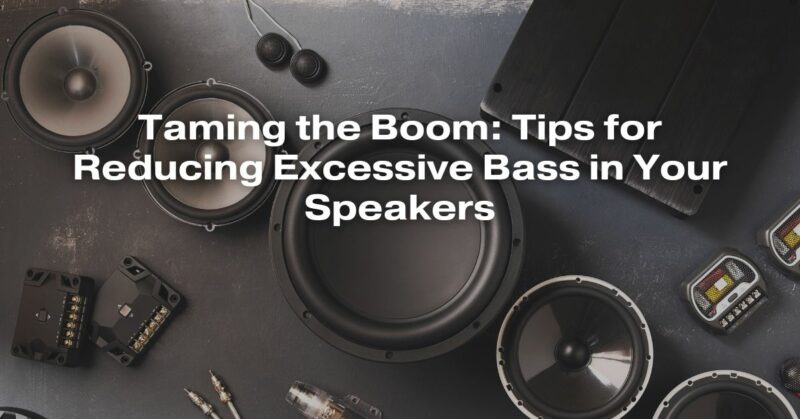Bass is a great part of music, but too much bass can be a bad thing. It can rattle your windows, disturb your neighbors, and even damage your speakers. If you’re finding that your speakers are producing too much bass, there are a few things you can do to reduce it.
1. Use the bass and treble controls on your speakers. Most speakers have controls that allow you to adjust the bass and treble levels. If your speakers are producing too much bass, simply turn the bass control down.
2. Place your speakers in the right location. The placement of your speakers can have a big impact on the amount of bass you hear. If you place your speakers too close to a wall or corner, they will produce more bass. To reduce bass, try moving your speakers away from walls and corners. You can also try placing them on stands or brackets to raise them off the ground.
3. Use a subwoofer. A subwoofer is a speaker that is specifically designed to reproduce low frequencies. If you have a subwoofer, you can reduce the amount of bass that your main speakers produce by adjusting the crossover frequency. The crossover frequency is the point at which the subwoofer takes over from the main speakers. To reduce bass, set the crossover frequency to a higher setting.
4. Use foam bass traps. Foam bass traps are acoustic panels that can be used to absorb low frequencies. If you have excessive bass in a particular room, you can try placing foam bass traps in the corners of the room or behind your speakers.
5. Use an equalizer. An equalizer is a device that allows you to adjust the frequency response of your audio system. If you have an equalizer, you can use it to reduce the amount of bass that your speakers produce by lowering the gain at the low frequencies.
6. Upgrade your speakers. If you’ve tried all of the above and you’re still having problems with excessive bass, it may be time to upgrade your speakers. Some speakers are simply better at handling bass than others. When choosing new speakers, look for a pair that has a good reputation for bass reproduction.
Here are some additional tips for reducing excessive bass in your speakers:
- Use a sound bar. Sound bars are typically designed to produce less bass than traditional speakers. If you’re looking for a way to reduce bass, consider switching to a sound bar.
- Use headphones. Headphones are a great way to reduce bass without disturbing others. If you’re listening to music late at night or in a small room, consider using headphones instead of speakers.
- Turn down the volume. The louder you play your music, the more bass you’re going to hear. If you’re having problems with excessive bass, try turning down the volume.
- Close the windows and doors. If you’re playing music in a room with open windows and doors, the bass will travel outside and disturb your neighbors. To reduce bass, close the windows and doors.
If you’ve tried all of the above and you’re still having problems with excessive bass, it may be time to consult with a professional audio engineer. They can help you identify the source of the problem and recommend solutions.
It’s important to note that there is no one-size-fits-all solution for reducing excessive bass. The best solution for you will depend on your specific situation and setup. However, the tips above should give you a good starting point.


